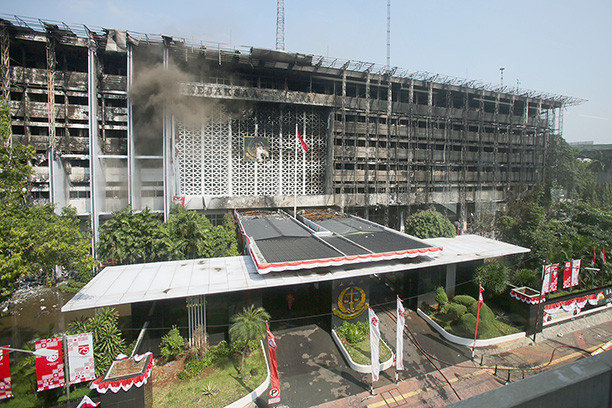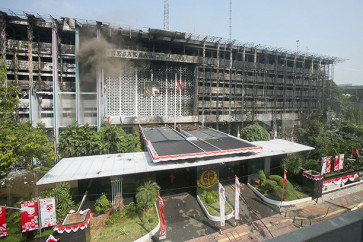Popular Reads
Top Results
Can't find what you're looking for?
View all search resultsPopular Reads
Top Results
Can't find what you're looking for?
View all search resultsAnalysis: Troubled Indonesia Eximbank hit by another round of Rp 2.5 trillion fraud
Change text size
Gift Premium Articles
to Anyone
T
he financially troubled Indonesian Export Financing Agency (LPEI), known as Indonesia Eximbank, has suffered from another round of bad debts, resulting from fraud. Finance Minister Sri Mulyani Indrawati recently submitted a report of fraud at the bank involving four borrowers, amounting to Rp 2.5 trillion, to the Attorney General’s Office (AGO). More problems are expected to be revealed as more borrowers also fall under the AGO’s investigation.
The four borrowers are PT RII, which emerged as the company with the highest indication of fraud at Rp 1.8 trillion, followed by PT PRS with Rp 305 billion, PT SMS with Rp 216 billion and lastly PT SPV with Rp 144 billion. These companies operate in various sectors, ranging from palm oil and nickel to coal mining and shipping.
According to Attorney General ST Burhanuddin, the finance minister’s report represents the first stage of findings from an integrated team, comprising the deputy attorney general for civil and state administrative court affairs (Jamdatun), the Financial and Development Supervisory Agency (BPKP), and the Finance Ministry’s Inspectorate General. A second stage of findings is expected to follow, allegedly involving six companies with fraud amounting to Rp 3 trillion.
As of now, these six companies are still undergoing examination by the integrated team, and Burhanuddin advised them to cooperate and to carry out the team’s recommendations, as failure to do so may lead to criminal prosecution by the AGO. Burhanuddin added that the report on the six companies will subsequently be handed over to the Jamdatun for asset-recovery purposes.
The recent cases had been detected since 2019 following reports of the bank’s worsening non-performing loan (NPL) rate, which has been consistently high since 2018, with double digit net NPL, far above the 5 percent limit set by the Financial Services Authority (OJK). The OJK issued a new ruling in 2022 stating that the 5 percent bad debt ratio only applied to commercial banks but not the LPEI, and therefore, the LPEI has not broken any OJK regulation.
The high NPL rate prompted the Supreme Audit Agency (BPK) to audit the bank from 2017 to 2019. The BPK concluded that the bank had not been prudent in extending loans and identified a number of bad debtors. One was a business group belonging to businessman Johan Darsono, which eventually led to an noncollectable loan of Rp 2.18 trillion. Another big debtor was textile producer PT Duniatex, with problematic debt totaling Rp 3.05 trillion, which according to Eximbank had already been restructured. In addition, the bank also recorded problematic debt of Rp 766.7 billion owed by coal miner PT Bara Jaya Utama.
Based on the BPK audit, the AGO launched an investigation in 2022 into the Johan Darsono group, Duniatex, Bara Jaya Utama and six other firms that had borrowed from the bank and eventually named Johan Darsono and his executive Suryono suspects in embezzlement and money laundering cases, along with former LPEI managing director Arif Setiawan and four other former executives of the LPEI.



















